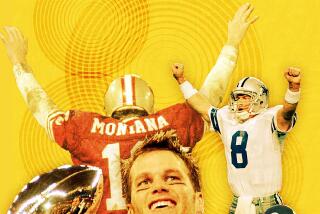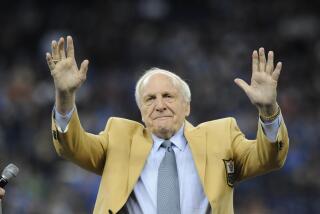Homeless
- Share via
NASHVILLE — Joe Gilliam plans to watch his old team, the Pittsburgh Steelers, in the Super Bowl.
Where he’ll watch, Gilliam doesn’t know. He doesn’t know where he’ll sleep that night, either.
Jefferson Street Joe, who won two Super Bowl rings with the Steelers in the 1970s, is living on the streets of his hometown. He’s been fighting drug addiction for over two decades now.
The fact that he will watch the Steelers try for their fifth championship is about the only sure thing Gilliam knows right now.
“I take one day at a time, you know. A couple of days, that’s too far down the line at this point,” Gilliam said last week at a restaurant in his old neighborhood.
He said he hasn’t used heroin, a drug he began taking in late 1975, in over five years. Now he smokes some crack, but said only God can help him stop.
“I’m not really as bad as I seem,” Gilliam told The Tennessean. “I’m over the hump. I can take it or leave it.”
Gilliam has mixed stints as a drug-rehabilitation counselor between a string of arrests on charges ranging from possessing drugs and weapons to a 1991 armed robbery of a Louisiana restaurant.
Slipping back to drugs is too easy for an addict, Gilliam said, no matter what kind of support comes from friends and family.
“I stopped doing the things that I was supposed to be doing, the things that helped me with my sobriety,” he said. “Almost everybody who’s had a relapse has stopped doing something he should’ve been doing to help maintain his sobriety. That’s exactly what happened.”
Gilliam’s place in NFL history is solid enough.
Picked in the 11th round by the Steelers in 1972, Gilliam became the first black quarterback to start a regular-season game when he led Pittsburgh over Baltimore 30-0 in the 1974 opener.
He got his chance when Terry Bradshaw refused to cross the picket line that summer during a players’ strike. Gilliam said coach Chuck Noll promised him a shot at the starting job if he crossed the line.
But he lost his spot despite a 4-1-1 start and a three-game winning streak. Gilliam said he thinks race, hate mail and rumors of threats to Three Rivers Stadium played a part. Noll said he simply wanted a change.
Gilliam stayed involved the rest of the 1974 season, standing next to Noll and helping with play selection during the Steelers’ Super Bowl victory over Minnesota.
In 1975, Gilliam remained a backup and threw only 48 passes. He started using heroin late that year.
The New Orleans Saints claimed him off the waiver wire in 1976. Gilliam lasted a short time before being dismissed for breaking team rules.
Hometown headlines chronicled his attempts at semipro ball and the USFL. Also noted were numerous arrests, repeated trips to drug-rehabilitation units and his work as a rehabilitation counselor.
In the late 1970s, he hocked his Super Bowl rings to buy drugs. An ABC report during the 1988 Super Bowl resulted in a group of businessmen buying back one ring for Gilliam.
He now has both rings, but they are at his parents’ home for safekeeping.
Good nights come when Gilliam has enough money to stay in a rooming house. Other times, he sleeps where he can.
He’s in frequent contact with his family, who have repeatedly tried to help him. His older brother Craig even gave him a job as his offensive coordinator in 1993 at Lane College, a Division II school in west Tennessee. Gilliam passed his drug tests but stayed only one year.
Craig Gilliam wishes people would quit dredging up his brother’s story.
“All they are doing is capitalizing on that hype, that’s all. Now everybody is writing about him. Why not last year? What about 19 years ago? It’s a bunch of hogwash,” Craig Gilliam said.
The Steelers’ return to the Super Bowl has put the former quarterback back in the spotlight here. Everyone wants to talk football, who he thinks will win, and how he’s faring.
Wearing a new warm-up suit, sneakers and black baseball cap, Joe Gilliam said he had hopes for the future.
He has talked with his father, former college coach Joe Gilliam Sr., about a football camp for juvenile and adult offenders looking to learn a skill and how to cope with life after jail. He’s also looking for a job.
Gilliam doesn’t worry about what might have been and the mistakes he’s made in life.
“Other people do it for me, you know what I mean . . . and I just refuse to look at it that way. I’d never be able to get up, you know? I couldn’t go on. It happened, I let it go,” Gilliam said.
More to Read
Go beyond the scoreboard
Get the latest on L.A.'s teams in the daily Sports Report newsletter.
You may occasionally receive promotional content from the Los Angeles Times.










